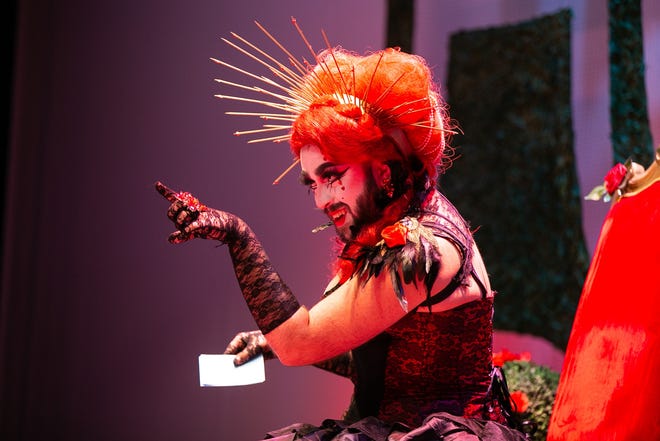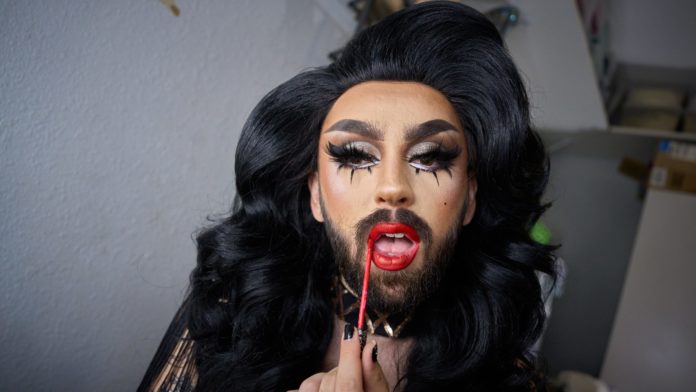On July 30, five days before the Biden administration would declare monkeypox a public health emergency, Trey DeGroodt revealed his own diagnosis to his thousands of social media followers: “I’ve got a case of the monkeypox.”
As he suffered through “the worst pain I’ve ever felt in my life,” support was pouring in for the 24-year-old, who is a full-time drag performer in Phoenix.
Friends sent money to help him stay afloat while he was unable to work. One person sent a box full of items that would help DeGroodt through his recovery. His uncle delivered four bags of groceries, and his roommate brought the supplies upstairs, where he was quarantining in his room.
“I’ve gotten so many direct messages and things like that of ‘We love you. Take care of yourself. How can we help you? Are you doing OK?’ You know, so the community really rushed to my side,” DeGroodt told The Arizona Republic.
‘This could happen to anybody’:Gay men in Phoenix confront monkeypox threat
‘My community came to my aid’
After enduring the worst of the rashes, lesions, fever, headaches and exhaustion, DeGroodt — who has since fully recovered — was inspired to share the resources he wished he’d had from the beginning.
This has turned into him making monkeypox care kits full of the essentials that helped him get through the worst of the lesions.
“I’m grateful, so I’m trying to pay it forward because my community came to my aid in my time of need. Now that I’m feeling a lot better, I want to help the community that is now in need,” he said.
“That’s really what it’s about, because we as gay people, we get to choose our family, right? That’s what RuPaul says. And my family really came to help me. So I’m trying to really come to help my family.”
‘I was like, ‘Yeah, this is monkeypox”
The first time DeGroodt had heard of the global monkeypox outbreak was when his friend Alessandro Rugge tested positive for the virus in early July. (Rugge spoke with The Republic about his experience and efforts to educate others about monkeypox.)
“I sort of saw his experience through it and how terrible it was. And so obviously I was like, ‘All right, when can I get this vaccine?’” DeGroodt said.
The Jynneos vaccine is being offered through clinics and “prioritized for people who are at higher risk of getting monkeypox,” according to the Maricopa County Department of Public Health. DeGroodt got his first dose on July 27.
Within days, he started experiencing symptoms. On July 30, he shared on Facebook, “Truthfully, I’m not doing too bad.” On Aug. 1, he wrote that he was experiencing “the worst, most excruciating pain I have ever felt in my life.” By Aug. 7, thankfully, he was feeling “so much better,” he posted.
“I would have been exposed before I got the vaccine,” DeGroodt said. “I started showing symptoms, the fever and the headache and the muscle soreness, and I sort of (put it down to) ‘Huh, maybe I’m just feeling a little but burnt out. Maybe it’s a cold.
“And then by the weekend I was having the rashes and the blemishes, and I was like, ‘Yeah, this is monkeypox,’” he said.
Monkeypox:How many cases are in Arizona, what to know about the virus and how to get the vaccine
What are monkeypox symptoms?
DeGroodt’s experience reflects the Centers for Disease Control’s messaging: Symptoms usually start within three weeks of exposure, and if a patient develops flu-like symptoms, they can develop a rash one to four days later. According to the Maricopa County health department, this often starts on the face and spreads around the body.
It starts as flat and round discolorations that “become raised and fluid-filled (clear or pus) before scabbing. These spots and the fluid in them carry virus that can infect others,” according to the health department’s page for monkeypox.
“Once they sort of start to transform into the ulcerated lesions, that’s when it gets really, really painful and really, really hard,” DeGroodt said. “I was very lucky. I only had probably like 50, 60, lesions. There are people who have hundreds, thousands all over their whole body, right?”
Illness lasts for two to four weeks, and “once all scabs have fallen off and a fresh layer of skin has formed, a person is no longer contagious,” according to the CDC.
The first probable case of monkeypox was reported in Maricopa County on June 7. As of Aug. 29, 261 confirmed and probable cases have been identified by the county health department, with more than 18,000 across the country as of Aug. 29, according to the CDC.
The health department recommends calling a health-care provider and informing them of any symptoms, including “any unexplained rash.” Providers can be found through https://findhelpphx.org or 602-506-6767.
‘It’s about feeling welcomed’:How gay youth find belonging in Phoenix’s ballroom scene
‘This was the worst pain I’ve ever felt in my life’
Known as the “bearded burlesque Broadway beauty” of Phoenix, as a drag queen DeGroodt — better known by some as her stage name, Trey — knows physical discomfort well.
“I do drag for a living. I’m in corsets and wigs and high heels and eight pairs of tights and uncomfortable, itchy costumes, and it’s nothing. It’s like a normal day at the office, you know?” he said. “But this was the worst pain I’ve ever felt in my life.
“And I have a very high pain tolerance. Not only, like, physically, is it painful and it hurts and your body is tired and you have fevers and chills and the lesions are very painful, but it’s kind of emotionally and mentally very draining and very isolating.”
DeGroodt used calamine lotion on his lesions and Bactine as a pain-relieving antiseptic. Neosporin helped reduce the risk of infection, and Terrasil ointment soothed the pain. He also took oatmeal baths for inflammation relief. Prescription lidocaine ointment, an anesthetic, helped stopped the pain and itching.
What was also essential for his recovery, DeGroodt told The Republic, were edibles: “The THC — weed — was the thing that got me through it.” And “the number one thing I could do was sleep.”
He detailed the treatments that helped him through his monkeypox symptoms in a 20-minute Instagram Live that he made permanently available on his Instagram account as a “monkeypox guide.”
He makes it clear that this is not medical advice but rather him sharing his personal experience.
“I’m glad that I can help people and give them a little guidance,” DeGroodt said. “Of course, I always say I am not a doctor. … I don’t know anything other than I’ve had it, you know? So if you really need help, go see a doctor.”
It wasn’t an easy decision to be so public about the lesions and hemorrhoids he was suffering from. But he doesn’t regret doing it.
“I had two choices between ‘Do I fly under the radar with this … and not talk about it?’ Or do I be a face for this thing?” DeGroodt said. “And I think I made the right choice. I hope I made the right choice.
“I could be the resource I wish I had right now because there really (aren’t) any resources out there,” he said.
‘I’ve sort of become a local resource for monkeypox’
When DeGroodt started looking up treatment options for monkeypox in late July, he came across many articles with outdated information.
Though he’d initially sought help from his primary care physician, DeGroodt felt the doctor “made it a gay thing in a negative way rather than being like, ‘We know what you’re going through. Let’s help you through it.’”
So he turned to a WhatsApp group his friend Alessandro Rugge started for monkeypox patients, which has a couple dozen users. There, Rugge shared a Google document — a “monkeypox wellness guide” in which he compiles symptom management advice from personal experiences as well as links to the CDC’s guidance and scientific studies.
By sharing his experience with his 4,800 Instagram followers and encouraging open discussions about monkeypox, DeGroodt hopes that fewer people “get the stigmatized experience” when seeking medical help.
“I don’t have millions of followers. But if you know drag and you know gay culture in Phoenix, you most likely have heard of me. … So I said, ‘Why don’t I use this position of power and this position of privilege to help people?’” DeGroodt said. “And I’m glad I did.”
“The reason I’ve sort of become a local resource for monkeypox is I’ve been very open about my experience the whole time,” DeGroodt added. “Because I think that is what’s going to make people understand it a little bit better and also be more conscious about what it means.”
How to request or sponsor a monkeypox care kit
On Aug. 10, DeGroodt posted a photo of several paper bags with some of those over-the-counter treatments that helped with his recovery. These were monkeypox care kits, he wrote in the Facebook post, and anyone is welcome to request or help sponsor them.
“If I had those things on day one, rather than, like, day four or five, it might’ve saved me a lot of pain, a lot of time and a lot of torture,” DeGroodt said.
“A lot of people can’t afford a doctor. A lot of people don’t have insurance. … So if I can offer them a bit of support and a bit of relief despite them not being able to get the care they need, I’m so glad I can do that.”
He started filling bags with the surplus he had from the friend who sent five of each item he’d requested and purchased more treatments online. DeGroodt nearly cleared out his local pharmacy’s inventory for calamine lotion and Bactine at one point, he said.
“It would be cruel and selfish and bad karma points for me to not pay it forward,” he said. “Also, what am I going to do with five bottles of calamine lotion?”
He’s delivered “a handful” to friends as well as strangers, DeGroodt said.
Whether you’d like to request a care kit or sponsor one, DeGroodt can be reached via direct message on Instagram (@praythetreyaway) and Facebook https://www.facebook.com/tdegroodt. He is accepting donations of any amount on Venmo (@PrayTheTreyAway) as well as offers to help make or deliver kits.
‘If you can laugh about it, you can talk about it’

On Aug. 18, after receiving a “green light” from the doctor “to return to the world,” Trey was back on stage at Kobalt Bar performing “I Never Met a Wolf Who Didn’t Love to Howl” from “SMASH” at her first Cirque Du So Trey show in a month.
“The show was like, so sold out, so busy and crazy. So that was really exciting because a lot of people were there to welcome me back,” DeGroodt said. “It was like a dream come true, truly. I cried when I got off stage at the end of the show. Like, ‘Oh my God, I missed this so much.'”
She was not shy about incorporating her monkeypox experience into the set; for the dates that she couldn’t perform, Trey included an introduction video of herself in which she made jokes while dressed as a monkey and gave a PSA about the virus.
“I think you sort of have to find ways to laugh at it and make sure that it’s accessible and understandable,” DeGroodt said. “And I do think those things further break the stigma and get people comfortable talking about it because if you can laugh about it, you can talk about it.”
Reach Entertainment Reporter KiMi Robinson at kimi.robinson@gannett.com. Follow her on Twitter @kimirobin and Instagram @ReporterKiMi.
Support local journalism. Subscribe to azcentral.com today.








